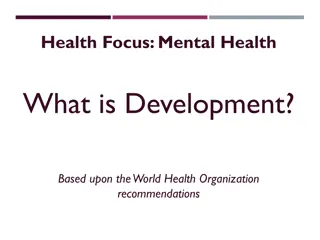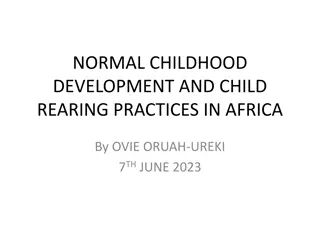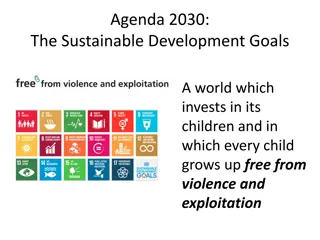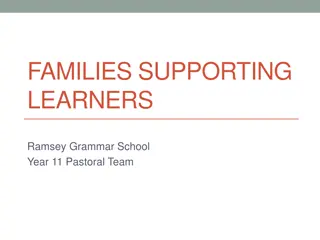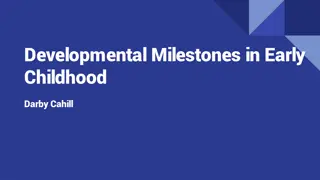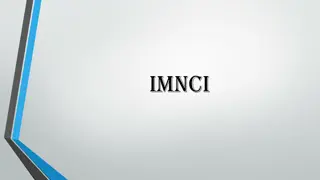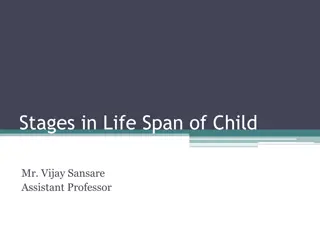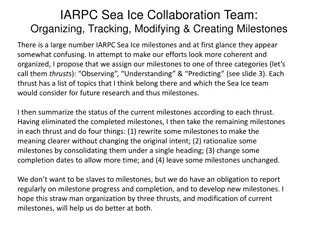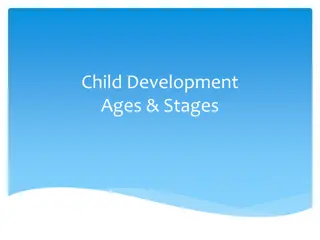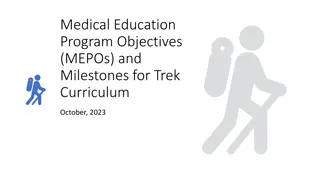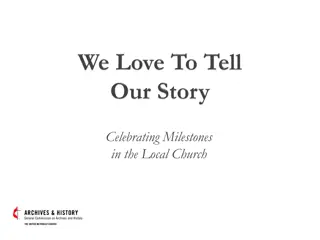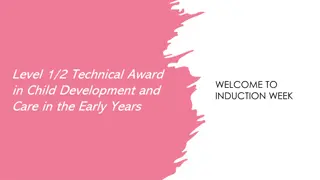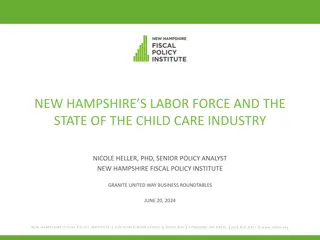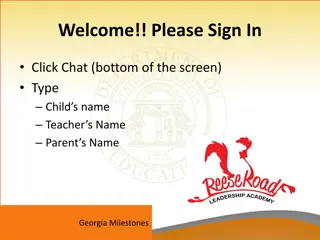Understanding Your Child's Development Milestones
Explore the importance of monitoring developmental milestones, learn about different areas of milestones at various ages, understand steps to take if concerns arise, and discover tools to track your child's development effectively. Also, grasp why monitoring is crucial in identifying common developmental concerns and supporting your child's growth, highlighting statistics on developmental disabilities and autism spectrum disorder prevalence among children.
Download Presentation

Please find below an Image/Link to download the presentation.
The content on the website is provided AS IS for your information and personal use only. It may not be sold, licensed, or shared on other websites without obtaining consent from the author. Download presentation by click this link. If you encounter any issues during the download, it is possible that the publisher has removed the file from their server.
E N D
Presentation Transcript
MILESTONES MATTER: UNDERSTANDING YOUR CHILDS DEVELOPMENT [Enter presenters' information here] An
What You Will Learn Demonstrate why monitoring milestones are important in identifying common developmental concerns Learn about the different areas of developmental milestones that children reach at different ages Know what steps to take if there is ever a concern about your child s development Learn about free tools and resources to help monitor your child s development including how to communicate concerns with teachers, healthcare providers, and others [If applicable: Learn about state/local resources]
Why Monitor Your Childs Development? Developmental disabilities are common and often not identified before school age 1 in 6 children (3 17 years of age) has a developmental disability1 Developmental disabilities are even more common among children from low- income households, with 1 in 5 children experiencing a developmental disability1 1. Zablotsky, B, et al, Pediatrics 2019
Why Monitor Your Childs Development? About 1 in 36 children is estimated to have autism spectrum disorder (ASD)1 1. Maenner, MJ, et al. CDC, MMWR Surveillance Summary 03/2023
What Are Developmental Milestones? Things most children can do by a certain age like: By 2 months: reacting to loud sounds By 9 months: lifting arms up to be picked up By 3 years: drawing a circle, when you show them how Children reach milestones in how they play, learn, speak, act, and move Though all children develop at their own pace, most children reach developmental milestones at or around the same age
Why Monitor Developmental Milestones? Monitoring developmental milestones enables parents to support their child s growth and act early if there is a concern. In a recent survey, parents frequently searched for information about developmental milestones. When 1,002 parents were asked about child-rearing topics they seek information about, 70% reported seeking information about developmental milestones, which was the highest score among topics. 5Zero to Three survey, 2018
Domains (Areas) of Development Social/Emotional Language/Communication Cognitive (learning, thinking, problem-solving) Movement/Physical
So Many Milestones to Celebrate! Monitoring milestones helps every parent and caregiver support their child s development CDC s Learn the Signs. Act Early. Milestones in Action Photo and Video Library shows what each milestone looks like in real-life situations
CDCsMilestoneMaterials Free Tools for Monitoring Children s Development www.cdc.gov/ActEarly/Materials
Milestone Checklists Free, printable checklists are available online (and in the Milestone Tracker app) featuring Developmental milestones by domain/area of development Guidance on what to expect for most children by the next age checklist (up to age 5 years) Open-ended questions for you to answer Parenting tips and activities to help your child learn and grow Guidance for what to do if you have a developmental concern Early intervention information Reminders about well visits and developmental screening
Amazing Childrens Books Milestones highlighted throughout story Parent tips and information about when to act early on concerns Available in English and Spanish Order free books: https://www.cdc.gov/ActEarly/Orders
All Materials are Relatable and Accessible Written in family-friendly language Includes milestones easy to see in your child Milestones were tested for understanding with families from diverse backgrounds Available in multiple languages and in a variety of formats (paper, online, and app)
CDCs Milestone Tracker App Includes the same content as the milestone checklists Available in English and Spanish Available for iOS and Android phones Interactive milestone checklists show each milestone with a photo or video FREE with no ads Easy to use Milestones in Action photos and videos show you what each milestone looks like Available at: www.cdc.gov/MilestoneTracker Available at: www.cdc.gov/Sigamos
Start Monitoring Your Childs Development Today! Download CDC s Milestone Tracker app Order a Milestone Moment booklet Order children s books Complete an online milestone checklist Visit cdc.gov/ActEarly for resources and information
Developmental Monitoring, Screening, and Evaluation What is the Difference? Learn the Signs. Act Early. materials are for DEVELOPMENTAL MONITORING
How to Get Help For Your Child If your child is not meeting a milestones for their age or you have ANY concerns: Don t wait; acting early can make a real difference Make an appointment with your child s healthcare provider Complete a milestone checklist Write down your questions and concerns; take them with you to the doctor s appointment *If you or the doctor thinks there might be a delay, ask the doctor for a referral to a specialist who can do more evaluation. Ask your child s doctor about developmental screening
Early Intervention is Best The earlier a child is identified as having a developmental disability or delay, the sooner interventions and family supports can start While earlier is better, it is never too late to start services and get support Early intervention can improve your child s skills, abilities, future school performance, and long-term self-care Early identification and intervention help families understand their child s strengths as well as areas in which they may need support Getting services for developmental delays early can help prevent challenging behaviors later
What Else Can I Do? You can also connect with your state or territory s early intervention program to find out if your child can get services to help. A doctor s referral may not be necessary. If your child is under age 3: Call your state or territory searly intervention program and say: I have concerns about my child s development, and I would like to have my child evaluated to find out if they are eligible for early intervention services. If your child is 3 years old or older: Call the local public elementary school, ask to speak with the person in charge of special education, and say: I have concerns about my child s development and would like to have my child evaluated through the school system for preschool special education services.
CDCs Act Early Ambassadors Represent 48 states; Washington, DC; and 3 territories Champion CDC s Learn the Signs. Act Early. program Are passionate about child development and early identification Work to add developmental monitoring into programs across their state/territory Connect with your ambassador here: cdc.gov/ActEarly/Ambassadors
Contact Us! [Enter presenters contact information here] CDC s Act Early Inbox ActEarly@cdc.gov


